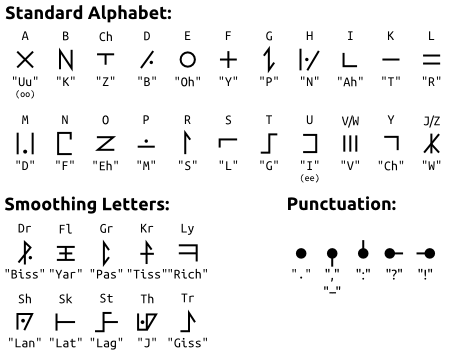Have you ever wanted a fantasy/rune/sci-fi/glyph language to use in your RP, but didn't want to spend years learning something like Elvish or Klingon?
Well you're in luck! Zirka is a right-to-left written and spoken language that I've has been developing on and off since about October 2004, and it’s available for everyone to use!
I borrowed from several other languages and developed simple grammar rules that have turned Zirka into a full-blown language all its own. It’s an approximate language at best, but that makes it perfect for easily crafting runic inscriptions or cryptic alien messages. But that doesn’t mean you can’t also make full pages of text in Zirka to also make an entire library worth of text if you really wanted to! The thing that's most fun about Zirka is that it’s not just a written language—you can read it aloud, too! It’s intended to feel mysterious but be translatable, to look cool but be pronounceable.
You can find out everything you need to know about Zirka on the website, http://alamantus.com/zirka (trust me, there's a lot more helpful stuff there), but I'll put some basics here to try to get you to check it out.

Zirka Grammar is simplified for ease of use, but some of these simplifications may initially lead to some confusion. If you pay attention to the basic rules and try to bend your thinking to a mindset of “simplicity,” then it should be pretty easy to get the hang of after some practice. The rules written here are truncated a lot, so check out the "How to Use" page on the website for a full explanation.
Verbs have no conjugations and tense is specified by a separate time-identifying word. Instead, always use the root verb of the language you are translating from (i.e. the infinitive form excluding “to”).
------------------------------------------------------
And those are the extreme basics!
Again, there's a lot more to learn on the website, so if you're interested, go check it out! As an example, here's some text translated:
"This is an example sentence." => "This iz eksampel sentens." => "Jal aw otludmor lofgofl."
Anyway, I hope you find it useful and enjoy!
Well you're in luck! Zirka is a right-to-left written and spoken language that I've has been developing on and off since about October 2004, and it’s available for everyone to use!
I borrowed from several other languages and developed simple grammar rules that have turned Zirka into a full-blown language all its own. It’s an approximate language at best, but that makes it perfect for easily crafting runic inscriptions or cryptic alien messages. But that doesn’t mean you can’t also make full pages of text in Zirka to also make an entire library worth of text if you really wanted to! The thing that's most fun about Zirka is that it’s not just a written language—you can read it aloud, too! It’s intended to feel mysterious but be translatable, to look cool but be pronounceable.
You can find out everything you need to know about Zirka on the website, http://alamantus.com/zirka (trust me, there's a lot more helpful stuff there), but I'll put some basics here to try to get you to check it out.

Grammar Basics
Zirka Grammar is simplified for ease of use, but some of these simplifications may initially lead to some confusion. If you pay attention to the basic rules and try to bend your thinking to a mindset of “simplicity,” then it should be pretty easy to get the hang of after some practice. The rules written here are truncated a lot, so check out the "How to Use" page on the website for a full explanation.
- Zirka is written right-to-left.
- Basic sentence structure follows English rules.
- Letters that do not flow easily or do not have a smoothing letter are contracted with a shewa.
- Vowels do not flow and must be contracted with a shewa.
- For translation purposes, vowels are interpreted by the pronunciation of the Latin vowel.
- A = “Ah”
- E = “Eh”
- I = “Ee”
- O = “Oh”
- U = “Oo”
- Pronounced vowels that do not fit the above rule keep their English letter:
- “Ship” remains “ship” because the short “i” sound does not exist in Zirka.
- Plurals are simply the singular form of the word with “es” attached to the end.
- The only article used is the definite “the.” A and An are implied if there is no “the.”
- You can turn any adjective into a noun form by adding “ar” to the end of the adjective.
- You can specify “the study/art of” something by adding “ti” to the end of the word, in the same way as English uses “-ology.”
- “Nounified” adjectives that express a concept or feeling or do not refer specifically to an object (words like “happiness,” “anger,” “fear,” or “friendliness”) should instead take the adjective form of the word and add “dom” to the end while translating.
- Words ending in “-ing” that are not verbs (eg. “running” or “boring”) should drop the “n” and simply end in “-ig” instead.
- Possession is indicated by “of”, i.e. The mayor’s house = The house of the mayor.
Verbs
Verbs have no conjugations and tense is specified by a separate time-identifying word. Instead, always use the root verb of the language you are translating from (i.e. the infinitive form excluding “to”).
------------------------------------------------------
And those are the extreme basics!
Again, there's a lot more to learn on the website, so if you're interested, go check it out! As an example, here's some text translated:
"This is an example sentence." => "This iz eksampel sentens." => "Jal aw otludmor lofgofl."
Anyway, I hope you find it useful and enjoy!


